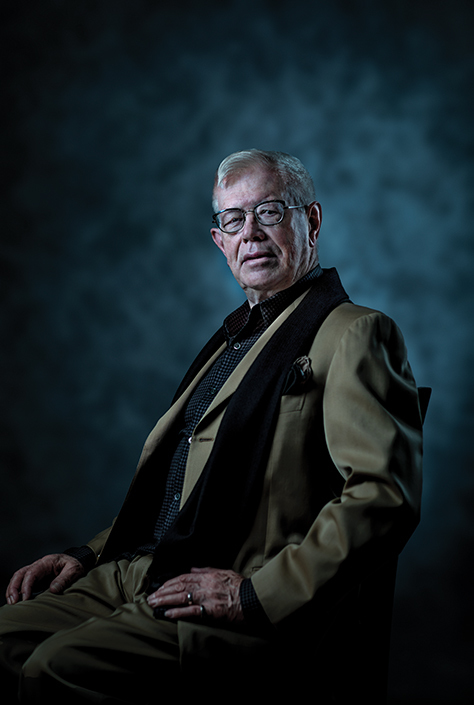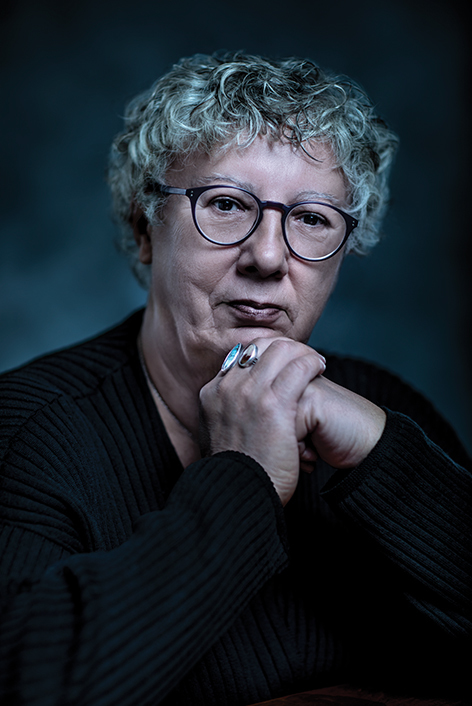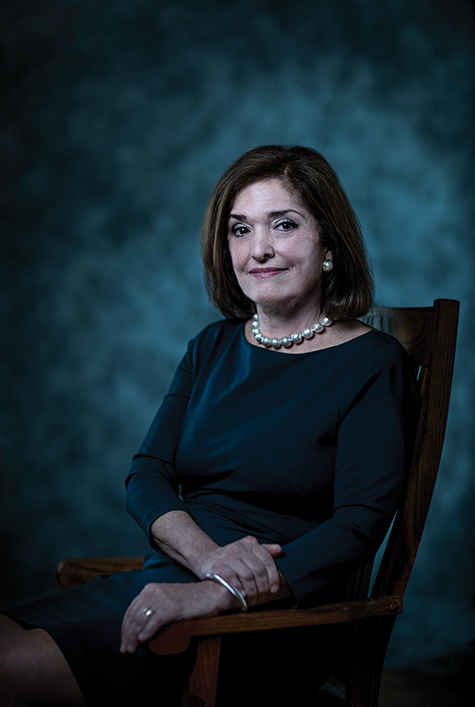
Bob Handelman
Gary Haller, the Henry Prentiss Becton Professor of Engineering and Applied Science, is director of the Henry Koerner Center for Emeritus Faculty. Among the center’s activities are the Intellectual Trajectories talks that have been collected in four books.
View full image

Bob Handelman
Gary Haller, the Henry Prentiss Becton Professor of Engineering and Applied Science, is director of the Henry Koerner Center for Emeritus Faculty. Among the center’s activities are the Intellectual Trajectories talks that have been collected in four books.
View full image

Bob Handelman
Hazel Carby, the Charles C. and Dorathea S. Dilley Professor of African American Studies and American Studies Emerita, wrote about her career in the most recent Intellectual Trajectories volume.
View full image

Bob Handelman
Hazel Carby, the Charles C. and Dorathea S. Dilley Professor of African American Studies and American Studies Emerita, wrote about her career in the most recent Intellectual Trajectories volume.
View full image

Bob Handelman
Professor of Nursing Emerita Angela Crowley wrote about how her own struggles to find child care shaped her research interests.
View full image

Bob Handelman
Professor of Nursing Emerita Angela Crowley wrote about how her own struggles to find child care shaped her research interests.
View full image
Norman Mailer once taught the Yale medical school professor Howard Spiro how to drop water balloons made from condoms out a Harvard window. Alexander Schenker ’53PhD, the titan of Yale Slavic studies, spent much of World War II working as a lumberjack in Russia’s northern forests—and talked his way into Yale graduate school without a college degree or even a high school diploma. Marie Borroff ’56PhD, the first woman to be named a Sterling Professor, went through the wringer in college. In one class, she wrote a paper every week on a single paragraph of Aristotle—and got Cs on many of them.
These are a few of the revelations that kept me glued to my seat as I read Intellectual Trajectories, a series of books that the Koerner Center, Yale’s center for emeritus faculty, began quietly publishing in 2009. The latest volume, fourth in the series, has just come out. You should read it—but you should also go back to the beginning and read the first three volumes too.
The Koerner Center has a wonderful custom of asking retired Yale faculty to give a lecture reflecting on the ideas and experiences that shaped them as scholars; each volume of this series is a collection of essays based on those talks. The essays are moving, entertaining, and more candid about personal struggles and academic politics than you might expect. Together they provide an eclectic window onto roughly a century of history: many of the essays in the early volumes begin in the Great Depression and World War II, while the most recent carry us through the latest round of culture wars. The stories they tell humanize the giant brains that float behind Yale’s lecterns, and help answer that ultimate question: what makes a person care deeply enough about something to devote their life to it?
The Koerner Center is an unusual place. Other universities offer some programming for retired faculty, but few offer them a physical home base—a white colonial house on Elm Street opposite the New Haven Green—supported by an endowment. Gary Haller, retired from the department of chemical engineering and head of college at Jonathan Edwards from 1997 to 2008, has directed the center since 2013. “I like to say that it’s like being head of a residential college, except the students are older and I don’t have to deal with their parents,” he told me. The Intellectual Trajectories lectures are the center’s most popular program, an opportunity for faculty to reflect on their own careers and learn more about colleagues they thought they knew.
The arc of the four volumes reflects what Yale was, and what it has become. The contributors to Volume 1 are overwhelmingly white men who grew up in the Depression years, served in World War II, or escaped atrocities in Europe as refugees. Many came to Yale for graduate school back in the days when Yale preferred to hire its own, and they never left. “Those who have the mistaken impression that Yale is blue-blood should read the stories of these people, growing up on farms, or the lower east side of New York City,” says Thomas Duffy, an emeritus professor at the School of Medicine who edited the most recent volume. “It’s amazing out of what circumstances people have achieved such eminence, and the passions that ignited that journey for them.”
Walter Cahn, an art historian, wrote about his childhood in Nazi-occupied France. He had to leave his parents behind when he and his brother were smuggled away to an unoccupied part of the country. As the Nazis advanced, the children “moved frequently from one hiding place to another, changing identity papers and assumed names whenever danger dictated,” he wrote. In hindsight, Cahn was convinced that his future as an art historian owed much to the Romanesque carvings at a Benedictine monastery that dazzled him on this refugee journey.
Such chance encounters are a prominent theme in the series. Historian David Brion Davis calls them “winds of fortuity.” Kai Erikson, a sociologist, admitted in his essay that as he reflected on his career, “I have a hard time seeing an underlying thread in it. I remember most of the critical points in my life as moments of sheer chance and contingency.” Richard Brodhead ’68, ’72PhD, the former dean of Yale College whose contribution to the fourth volume of the Intellectual Trajectories series is excerpted in this issue of the magazine, told me that “very few of us planned our careers. They just happened—through a combination of inner traits and circumstance.”
If you, too, feel as if you are bumbling along in life without much of a grand strategy, you might take comfort in the confessions of these former professors. I know I did. They range widely in how they interpret the brief to chronicle an “intellectual trajectory”: some dwell at length on childhood experiences, while others barely mention life before graduate school. Some go deep into the weeds of great books and big ideas, while others focus on the personalities of mentors and the practical challenges of economic and family responsibilities. Angela Crowley, professor emerita of nursing, reflected on how her own struggles to find child care as a young scholar shaped her research interests. “I wondered: if this is so difficult for me given my understanding of pediatrics and accessing resources, how much more difficult is this process for other families? Thus, I chose my area of research, the health and development of children in child care and their families,” she wrote. “It was an unusual area of scholarship for nursing faculty.”
The sheer breadth of experience in these volumes forces the reader to reflect on what constitutes a person’s intellectual journey, and how our own professional lives are a mix of rational intent, emotional momentum, and—perhaps mostly—chance. A few contributors did seem to leap into the world (or into graduate school, at least) with their passions fully formed, waiting to burst forth. Marie Borroff—the only woman to contribute to the series’ first volume—wrote about the awakening that shook her soul when she began to study philology in graduate school at Yale, the beginning of her path to becoming the first woman granted tenure in the English department. “Something strange and unexpected happened to me: when I opened that book about Anglo-Saxon (or Old English) and saw, for example, that there were in Old English seven classes of strong verbs, my heart was filled with joy,” she wrote. From that first semester, she “found an intellectual home in that material, and fortunately I have never lost the pleasure I first took in it. It never occurred to me that everybody else didn’t feel the same way.”
This is the origin story of Borroff’s single-minded love affair with medieval English literature, the infectious delight that reeled in so many of her students. “When you’re in college, you’re affected by some teachers,” says Brodhead. “Your life is lived in the presence of their magnetism. Their interests become so compelling to you. But typically, you have little sense of where they came from, why they think this thing is the most interesting thing in the world.”
These commitments to the life of the mind always unfold in the context of real-world struggles: parents losing jobs in the Depression; the daily lacerations of racism in the World War II–era military and the Jim Crow South; and—a major theme in the most recent volume—the barriers to women and people of color seeking academic careers. The fourth volume features the most women so far, although only one person of color. “I have spent a lifetime breathing through a mask and toughening my skin of (un)belonging,” wrote Hazel Carby, who taught African American studies and American studies.
These new perspectives are urgently needed, and overdue. At the same time, as Intellectual Trajectories has progressed, other viewpoints have receded from Yale’s community of teachers. Compared to the heavy presence of veterans in the earlier volumes, only three contributors to the fourth volume wrote about serving in the military, and only one of these saw combat. (Many more noted the role that evading the Vietnam draft played in motivating their academic careers.) Here is a gaping hole in Yale’s faculty that we rarely talk about, a missing perspective that would surely influence undergraduates’ grasp of connections between academic work and real-world suffering. “I’ve been thinking over the idea of majoring in history,” the historian David Brion Davis wrote to his parents from Stuttgart in 1946:
“It strikes me that history and proper methods of teaching it are even more important at present than endocrinology and nuclear fission. I believe that the problems that surround us today are not to be blamed on individuals or even groups of individuals, but on the human race as a whole—its lack of perspective and knowledge of itself, and that’s where history comes in. . . . To know why we act the way we do, we have to remember everything.”
Yet you will not find in these volumes an unabashed celebration of the life of the mind. Annabel Patterson, professor emerita of English, seems to question Davis’s confidence in the humanities. “I remember with shame my childish idealism about America and compare it with where we are now. What then is, or has been, the point of IT? To my undergraduates I have often said, if I could do IT all over again, if I had known then what I know now, I would have been a doctor.” Nor are these volumes a Yale love fest, by any means. “Although I have spent by far the larger part of my life at and around Yale, I have never felt at home in the institution, though perhaps I would not have anywhere,” wrote Jeffrey Sammons, a professor of German literature.
It turns out that even retired Yale professors, who achieved the pinnacle of success in their fields, have regrets. Reading their stories often filled me with regret too—mainly because I missed the chance to take a class with so many of these extraordinary teachers, or go to their office hours and pick their brains for life stories and advice. Think of these books as a chance to go back to campus and get a small taste of what you missed.
For example: I was a member of Jonathan Edwards College when Gary Haller was head of college there, but I had no idea of his fascinating childhood on a rural Nebraska farm before electrification. One afternoon, Haller and his brother were waiting on the roof of a grain storage shed, excited about the delivery of a new horse. They “very soon grew bored and started a competitive game,” he wrote. “We would slide headfirst down the shingled roof and arrest our forward motion at the last minute by grabbing the edge of the roof, getting points for how far we hung over the edge. I won this game by falling a couple of stories onto frozen ground, resulting in a compound fracture just above the wrist of my right arm.”
When I was in JE, Haller generously hosted excursions for students to enjoy theater, opera, and other high cultural arts in New York City. I was an ignorant undergraduate from the Midwest and intimidated by how little I knew about such things—and I was surprised to learn that Haller had once felt the same way. “I came to all of that late,” he told me recently. “I would say, to students who had never been to the opera or ballet, I can identify with that.”
Writing this essay gave me the excuse to call up Haller and talk to him for the first time in nearly two decades, to reconnect now that I am a fully formed adult who can appreciate insights that would have been lost on me as an undergrad. This is what the Intellectual Trajectories essays offer, even if you’re too shy to look up an old professor in the phonebook: here are portraits of the diversity of experience and patterns of lifelong curiosity that shaped the Yale you knew, and the Yale you probably didn’t.
 loading
loading
5 comments
-

Melinda Reingold, 10:52am July 12 2021 |  Flag as inappropriate
Flag as inappropriate
-

Mary Thies, 3:04pm July 12 2021 |  Flag as inappropriate
Flag as inappropriate
-

Mark Branch, 9:01am July 13 2021 |  Flag as inappropriate
Flag as inappropriate
-

Karina Danvers, 9:55am July 13 2021 |  Flag as inappropriate
Flag as inappropriate
-

Troy Murray, 3:01pm August 22 2021 |  Flag as inappropriate
Flag as inappropriate
The comment period has expired.Is there a summary compilation of these essays I could gain access to, virtually or in writing?
Where are these volumes available?
To order, contact emeritus@yale.edu or call 203-432-8227.
can we access them on line?
Our appetites are whetted by the author to obtain all four volumes but where are they available? Everywhere I turn, I’m told they are “Unavailable.”